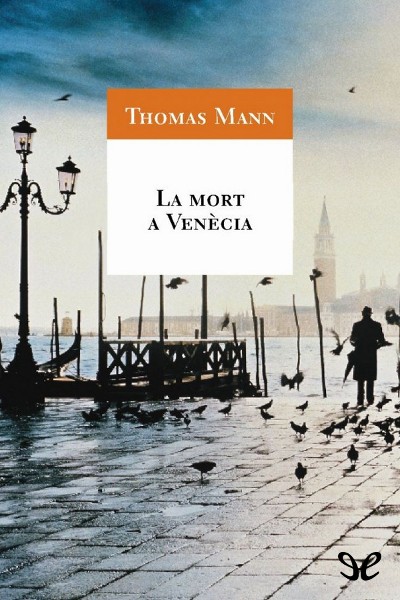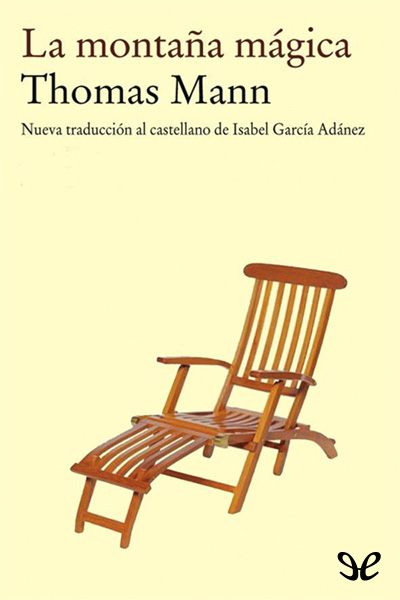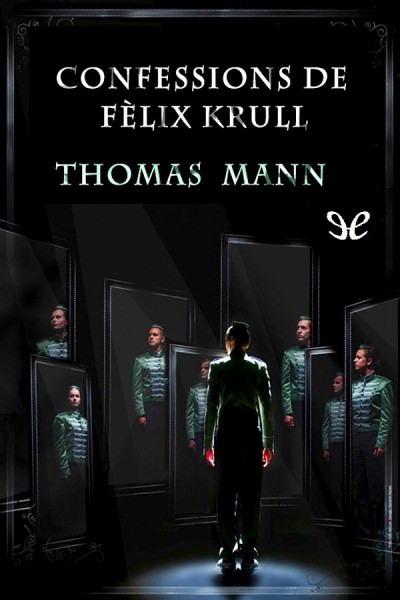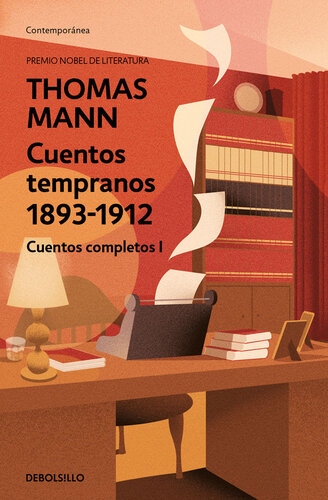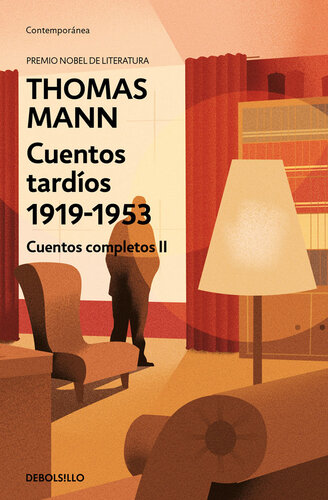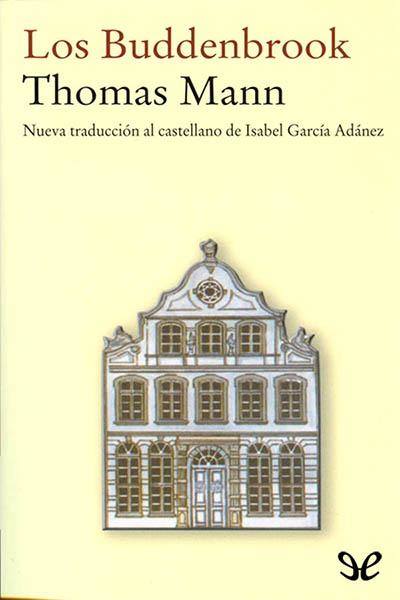oleebook.com
I Buddenbrook. Decadenza di una famiglia de Thomas Mann
de Thomas Mann - Género: Italian
Sinopsis
Il primo grande romanzo di Thomas Mann racconta la storia di una famiglia tedesca dell'Ottocento che dopo anni di prosperità è esposta a una tragica decadenza: le basi di un patrimonio e di una potenza che sembravano incrollabili sono sgretolate da una forza ostinata e segreta. Opera di ispirazione autobiografica, questo romanzo, capolavoro della letteratura europea, esprime compiutamente la concezione estetica e politica dello scrittore tedesco, il suo rimpianto per una mitica e solida borghesia, la coscienza della crisi di un mondo e di valori destinati inesorabilmente a scomparire.
Libros Recomendados - Relacionados
Reseñas Varias sobre este libro
Dont ask me why, but somehow I had expected this debut novel of Thomas Mann to be as stuffy as my actual copy of the novel, gathering dust on the shelves together with Doctor Faustus for almost fifteen years.
Fortunately, I was wrong. It was far less dusty than the shelf it has been lingering on and than I had expected.
I was impressed with Mann's evocative writing on music and surprised by the subversive role Mann ascribes to art and music.
If some free time would miraculously come my way, I might jot down some more impressions.2020 favourites germany ...more265 s Lisa1,056 3,314
Occasionally, reading and family life interfere with each other!
I have raised my children with the sole dogma that "I read, therefore I am". Being a family, we can't keep from judging each other according to our own specific reading preferences, and we usually believe that "we are what we read". At the moment, my son is reading Buddenbrooks while I am working my way through Brothers Karamazov, and we to compare notes, especially as both novels are focusing on complicated family patterns - with which we are quite familiar.
My son, frustrated with the character of Grünlich, a true sleazeball and hypocrite, complained that there seems to be a Uriah Heep in each family, thus reigniting a debate on David Copperfield that we had last year. Going on to reflect on the struggles of the different generations of Buddenbrooks to find a balance between individual and collective identity within a patriarchal family structure, he murmured:
"Some things are very much our family!"
Strong personalities, big dreams, different ideas and clashing worldviews - we came to the conclusion that most families go through the general changes that the Buddenbrooks experienced during the 19th century. We could detect the same power struggles in Dostoevsky and Dickens. So it is not so much that "we are what we read", but rather that "we read what we are". And that is what makes those old-fashioned, long, over-detailed classics shockingly contemporary and relevant to us.
Put a random set of characters into a house, make sure to create a balance of interdependence and delicate power distribution, and you will see them act out dysfunctional family life without needing a script to stick to. Brother One takes a role, which requires Brother Two to act out the antagonist's drama, while Sister One looks for a way out of the dilemma of being raised to obey her family and simultaneously to be proud of herself and her independence. Sister Two will oscillate between different positions to fill the gaps left by the rest of the family. And that is just the horizontal line. Add the vertical lines in the family tree and you are lucky if you manage to tell the story in as many words as Dickens, Dostoevsky or Mann.
Sounds a dull formula, but it isn't.
After all, that is what we call life, and it's not dull at all. We can all spend a whole day fretting over the fact that a sibling, parent, spouse or child used a certain kind of voice level when saying goodbye, and we can read a whole generation's worth of implications into the wave of a hand. Thomas Mann put down on paper what he had experienced first hand himself, and the very fact that the family is far from unique (on the contrary, quite common) is what makes it appealing to readers of all ages.
Family life turned world literature. World literature turned family competition. Who will finish first? My son with Buddenbrooks, or me with Karamazovs? If you say it doesn't matter, you know nothing of families at all.1001-books-to-read-before-you-die nobels thomas-mann223 s1 comment Ahmad Sharabiani9,564 50
(Book 782 from 1001 books) - Buddenbrooks: The Decline of a Family, Thomas Mann
Buddenbrooks is a 1901 novel by Thomas Mann, chronicling the decline of a wealthy north German merchant family over the course of four generations, incidentally portraying the manner of life and mores of the Hanseatic bourgeoisie in the years from 1835 to 1877. Mann drew deeply from the history of his own family, the Mann family of Lübeck, and their milieu.
In 1835, the wealthy and respected Buddenbrooks, a family of grain merchants, invite their friends and relatives to dinner in their new home in Lübeck, Germany. The family consists of patriarch Johann Jr. and his wife Antoinette; their son Johann III ("Jean") and his wife Elizabeth, and the latter's three school-age children, sons Thomas and Christian, and daughter Antonie ("Tony").
They have several servants, most notably Ida Jungmann, whose job is to care for the children. During the evening, a letter arrives from Gotthold, estranged son of the elder Johann and half-brother of the younger. The elder Johann disapproves of Gotthold's life choices, and ignores the letter. Johann III and Elizabeth later have another daughter, Klara. ...
????? ?????? ?????: ???? ? ??? ?????? ??? 2012??????
??????????? (???? ?? ??????) - ????? ??? (????) ?????? ?????? 782????
?????: ??????????? (???? ?? ??????)? ???????: ????? ???? ?????: ??? ???? ????? ?????? ????? 1383? ?? 782?? ????9647948026? ??? ??? 1385? ?????: ????????? ????????? ????? - ??? 20?
???? ?? ?? ?????? ???????? ???? ??????? ??? ?????? ???????? ?? ???? ???? ??????? ???? ? ?? ???? ???? ????? ?? ???? ????? ???? ????? ??? ???? ????? ???? ? ?????? ? ??????? ? ??????? ?? ???? ???? ????? ? ??????? ??? ???...? ? ????? ?? ???????? ????? ?? ????? ??? ???? ?? ?? ??????? ???? ?????? ???...? ?????? ??? ? ?? ???? ?????? ?? ???? ?????? ?? ??? ?? ??? ????????...? ???? ???? «???» ?????? ?? ??????? ? ????? ??????? ? ????? ???? «?????» ????
??? ?? ???: («????? ????????» ???: ?? ??????? ?????? ???? ???? ?? ?????? ??? ????????? ??? ?? ?? ?????? ?????? ? ??? ??? ???????? ? ?? ?? ???? ????????? ?? ??? ???? ??? ?? ??? ???? ? ?????? ????? ??? ? ???? ?????? ???? ?? ??? ??? ??? ?? ??????? ? ???? ???? ??? ???? ?? ???? ???? ??? ???? ?? ???????? ??????? ?? ????? ???????? ???? ???? ??? ??????? ?? ??? ????? ?? ?????? ?? ??????? ????? ? ??? ????? ???????? ??? ?? ?????? ??????? ? ?????? ? ????? ???? ?? ?????? ?? ?? ??????? ????? ????? ?????? (????? ???)? ?????? ????? ?? ???????? ???? ?? ????? ????????? ?? ????? ??????) ????? ???
????? ?????? ????? 07/08/1399???? ???????? 30/06/1400???? ???????? ?. ??????? Ilenia Zodiaco272 15.1k
Il mio stato d'animo a lettura ultimata:
Seconda fase:
Terza fase (rivolgendo il mio pensiero a Thomas Buddenbrook, in particolare):
big-books classici-moderni europea ...more151 s1 comment Paul Bryant2,280 10.6k
After a whole month of pecking away at this mountainous volume I arrived on page 232 and collapsed. I cant take it anymore. Thomas Mann starts his story with a dinner party that lasts for forty (40) pages. Things went downhill from there.
NOT MUCH TO SMILE ABOUT
Theres one reasonably good joke in the 230 pages I read. It's 1848 and a crowd of vaguely agitated working men and women have gathered around the council house. One of the beleaguered toffs confronts the mob and asks what exactly is it they want.
Lord Herr Consul, said Carl Smolt, somewhat abashed, Rivolution it has to be. Thers revolution iverywheer, in Berlin, in Paris
But, Smolt, what do you want? Just tell me that if you can.
Lord Herr Consul, I say we wants a republic; thats wat I be sayin-
But you fool, youve got one already.
Well, Herr Consul, then we wants another.
Sounds slightly Monty Python but thats all the mild humour you get in the stone-cold pudding of dreariness that is Buddenbrooks. The only fun to be had is when the pert young daughter gets married off to some grotesque nasty businessman who later goes bankrupt. Yeah, thats not much to laugh about.
THE ENDLESS PHYSICAL DESCRIPTIONS OF THE WEIGHTY NINETEENTH CENTURY NOVEL
Before the movies no one, it would seem, knew what anything looked . But everyone had an aching need to know every detail of a bourgeois familys clothes and home furnishings. So Thomas Mann, being aware of this, turns Buddenbrooks into a type of catalogue.
The snow-white cloth of woven damask on the round table had an embroidered green runner across it, laid with gold-bordered porcelain so translucent that it gleamed mother- of-pearl.
Today she wore her dark red dressing-gown. Its colour toned beautifully with the paper above the wainscoting, and its large-flowered stuff, of a beautiful soft texture, was embroidered all over with sprays of tiny glass beads of the same colour, while row after row of red velvet ribbons ran from neck to hem.
The Frau Consul wore a heavy grey ribbed silk trimmed with black lace, and a cap of lace and stiffened tulle, tied under her chin with a satin bow. The lappets of her cap fell down on her breast. Her smooth hair was still inexorably reddish-blond in colour, and she held a work-bag in both her white delicately veined hands.
The gentlemen are not exempt from this precise itemising.
He was slightly thick-set as to figure, but neither fat nor lean. He wore a black, already somewhat shiny coat, short tight trousers of the same material, and a white waistcoat, over which went a long thin watch-chain and two or three eye-glass cords. His clipped white beard was in sharp contrast with his red face. It covered his cheeks and left his chin and lips free. His mouth was small and mobile, with two yellowish pointed teeth in the otherwise vacant gum of his lower jaw, and he was pressing these into his upper lip, as he stood absently by the door with his hands in his trousers pockets and the black and white down on his head waving slightly, although there was not the least perceptible draught.
When he runs out of characters' clothing to catalogue he starts in on the weather.
After sunset a sultry breath, a hot blast from an oven, streamed out of the small houses and up from the pavement of the narrow streets. Today the wind had gone round to the west, and at the same time the barometer had fallen sharply. A large part of the sky was still blue, but it was slowly being overcast by heavy grey-blue clouds that looked feather pillows.
TECHNICAL ANALYSIS OF BUDDENBROOKS
Stodgy mindnumbing detailed description, as above : 37%
Banal conversation : 21%
Slightly more interesting conversation: 5%
Action sequences : 0%
People going in and out of each others houses: 19%
Prose that passes from the page to the brain and out again without making any discernible impression : 18%
Buddenbrooks is recommended for those who think that huge ponderous family sagas by Nobel prize-winning authors are by definition good for the soul.
Everyone else may skip this with a light heart and a carefree cartwheel.
abandoned novels151 s Luís2,057 821
Accurate to his elegant style, detailed and generous in the petty small details, Thomas Mann returned with this voluminous novel narrating the decline and anguish of a German family of the late nineteenth century.
All the complexes that can live (and suffer) upper-class people when they see themselves with distressing needs are described here, with a halo of nostalgia that surrounds the conversations. Which, more than talks, are reminiscent of a glorious and buoyant past that will not come back.
Tony, daughter of Herr Buddenbrook, says bitterly to his father: "Oh dad, we should never get away from these places, there are a lot of us here. In other places, they would not understand us, and we would suffer because of their gestures, mockery and dishonesty."
Tying to the earth (Lübeck), to what it was and isn't anymore, as unconsciously trying to make everything as it was yesterday, moderates this family's daily experiences.
all of Thomas Mann's works, the Buddenbrooks is a picture that mixes sociological with psychic, the old with current, and the beauty of the past with the harsh reality of the present.
A relaxing book read in one afternoon of copious rain without great surprises and sincere moments of meditation.e-5 german-literature historical-fiction ...more141 s Emily May2,052 311k
It was actually Boyne's A Ladder to the Sky that made me finally want to read Mann's work (I got so many recommendations from that book!). And I thought this would be an instant favourite-- I do love pretty much all family saga books.
Unfortunately, though, I experienced a real disconnect from the characters and story. Perhaps it's because this was Mann's debut and he falls prey to a number of debut author traps - getting caught up in his own masturbatory metaphor, for example - but I'm not sure.
The story of the Buddenbrooks is, as the subtitle suggests, about the decline of a wealthy German family during the nineteenth century. It follows multiple generations of Buddenbrooks through their daily minutiae, as well as through marriages and financial struggles. The problem is I felt I was reading one event after another without any emotional attachment to the characters and what was happening to them.
And I don't think it helps that the novel takes such huge leaps in time, missing out large chunks of the characters' lives.
Yeah, I get that its a portrait of what family life was in this specific time and place, and theres the whole thing with the tooth decay metaphor but, you see, I felt Mann put more feeling into writing about their teeth than into writing about their personalities. After a while, the repetitive metaphor of tooth decay for the decay of a family didn't seem that clever anymore. I guess I'll have to see if The Magic Mountain or Death in Venice are any better.
Though, I must say that this was my absolute favourite moment of the whole book. I don't know if it was intended to be funny, but I found it hilarious:
Go to the devil, you filthy sprat-eating slut!
And thus Tony Buddenbrooks second marriage came to an end.
Blog | Facebook | Twitter | Instagram | Youtube2018 classics132 s Magrat Ajostiernos624 4,217
4,5/5
Un clásico que se ha convertido ya en una de mis sagas familiares preferidas, una lectura nada densa pero sí muy melancólica que deja el corazón un poco roto a pesar de estar repleto de humor e ironía.
Aún siendo un Señor Ladrillo de 900 páginas, es un libro que cuesta soltar y que creo que todos los amantes de las novelas de personajes disfrutarán enormemente, porque pocos libros he leído que describan tantos personajes de manera tan clara, vívida e inolvidable.
La novela está ambientada en una ciudad al norte de Alemania; Lübeck, a finales del siglo XIX y retrata la vida de Los Buddenbrook esta familia de comerciantes ricos y cuyo apellido es sinónimo de poder y prestigio. A lo largo de cuatro generaciones, desde el abuelo Johann al que atisbamos brevemente hasta el pequeño y enterncedor Hanno, vamos a ver una historia de decadencia y cambio, del final de una estirpe, de una manera de entender la vida y del término de una sociedad tal y como la conocemos.
Los verdaderos protagonistas de la historia son Tony y Thomas, hermanos que vamos a ver desde niños hasta el final de sus días y que ocupan la mayor parte de la trama, y así como el inicio del libro y la primera parte (más protagonizada por Tony) es mucho más ligera y optimista, la segunda, protagonizada por su hermano Thomas y su hijo deja un regusto amargo por la tristeza que desprende. He amado profundamente ambos personajes y creo que son de esos que no se me irán nunca de la cabeza...
He disfrutado muchísimo de la lectura, de sus personajes, de la veracidad de sus sentimientos, de sus imperfecciones y lo fácil que resultaba empatizar con todos ellos, me ha encantado descubrir a ese Mann tan analítico pero divertido, un observador de su tiempo y de cada detalle que conforman el carácter de una persona.
En fin, un libro maravilloso aunque triste, en el que se nota esos tintes autobiográficos y la profundidad de los sentimientos del propio autor.2020 clásico favoritos126 s Kalliope691 22
MEAN REVERSION IS A BITCH...!!!
There is a concept in statistics, Regression or Reversion to the Mean, which is widely used in a variety of fields of knowledge. It was first realized by Sir Francis Galton, cousin of Charles Darwin, when he worked on the correlation of heights between adult children and parents.
The concept refers to the tendency for any variable which exhibits an extreme value at any point of measurement to move towards the average next time it is measured.
This mathematical tool is used regularly both in Genetics and in Finance Theory. Consequently, it is an apt model for dealing with the Buddenbrooks and their three Fs: Family, Firm and Fortune, and particularly so because the anchor of the family is precisely that: Trading. Their pride was founded upon the buying and selling of grains, and to do so in the appropriate manner with suitable methods, engaging in the right discipline, performing the relevant calculations, exerting their commercial savvy, and adhering to their code of ethics -- all of these constituted their pride and nature.
The novel begins with the second generation of a family and spans five generations. Their business had, however, one generation less. The book tracks the progression of the Buddenbrooks as a function of their prosperity. The characters and their circumstances are factors that exert a force in the success trend of the family.
In the Buddenbrooks the finances and identity of the firm and family are inseparably intertwined. The familys expenses are expenses for the firm. And profits from the firm accumulated as capital provide the income and living style of the family. The new Buddenbrooks house, the family symbol with which the novel begins, is a monument to itself. Family and firm reside there.
In addition to the launch of the triumphal house the novel regularly pegs the level at which the Buddenbrooks capital stands. They start off with a mark of 900k Marks and the subsequent levels, which can be plotted, guide us as we follow their successes or hardships. Johann Buddenbrook the Younger begins the apprenticeship of his son Thomas by giving a quick review of the big blocks composing their capital. He understands them well. Later on Tom gives the latest balance to his sister Tony, and although the figure sounds reassuringly high to her, he however adds with concern: we should be at one million The Buddenbrook capital has stayed sort of flat, which in any progression of prosperity means trouble. As we approach the end of the novel the family is valued at 650k, amount that will however decrease further as the assets are liquidated inadequately.
So, how does this function of prosperity work? The phenomenon of moving back to the Mean irremediably starts and both Genetics and Trading are players in the game.
Depending on their gender and their primogeniture the various members of family will have to perform a different role. The patriarchs, role reserved for the eldest son, are to be the main motor. When this works, it works, but the problem is that its dependency is concentrated on one individual becoming therefore too risky. We see that even the luck of begetting a male son does not guarantee the survival of the genes of mercantile prosperity. Christian turns out to be a good-for-nothing and therefore neither a support nor a back-up to the elder brother in any of the Buddenbrook responsibilities and activities. He becomes a deviation from the trend and a very strong pull away from excellence. Nor is Hanno a healthy alternative to the mercantile model. The boy inherits the artistic inclinations from his mother, but also the lack of discipline that we saw in his uncle. His musical abilities turn out to be good only for toying around with music, not really for playing or composing. He is not, as Tony hoped, a new Mozart. Surprisingly, Thomas Mann does not present the Arts and Music as Saviours for the Buddenbrooks. No redeeming transformation is generated.
The women and daughters occupy a very particular position. The daughters are detractors of a significant amount of the capital, since significant dowries have to be carved out of the sustaining trunk. These side investments are expected to bring back both prestige and an extended business clout with an overall benefit for the Buddenbrooks. In this family the dowries granted out were almost all utter failures. We know that money seduces swindlers honey attracts flies. And the Buddenbrooks, both the women and the men, suffer as the victims of the Gründlich hoax and of devout greed. The familys mercantile acumen was not able to detect the money-hunters. In spite of these failures, however, dowries did net in around 89k Marks thanks to the 300k that Gerda brought along when she married Tom.
But it is the concentration on the different roles that the various family members have to play, according to their gender, which increases the probability of failure. Tony is a convinced Buddenbrooks even if she suffered when she sacrificed her Morten. Could she have offered the business support to her elder brother once it was clear that Christian was not capable? Or could she, or her daughter and grand-daughter, have continued the family firm similarly to the way Donatella Versace has? This is hard to say, since after all it was she who persuaded her brother of the suitability of the Pöppenrader deal. Failure or hailstorm, had she been able to participate or take over the business, the probability of survival would have increased. With this possibility barred, the Pöppenrader misfortune takes place precisely and symbolically when Toms grandiose house and the Centennial of the firm are celebrated. It marks the resistance point and the decline clearly begins.
But not all the triggers for the Verfall can be found in the family members. The novel gives loose indications of the historical and economic conditions in which we see this familys progression. We learn that although Johann the Elder expressed antipathy towards the rising Prussia, he had made a great deal of his profits by selling his grains to the emerging Teutonic Kingdom. And several times the Customs Union is mentioned, although we cannot know in what specific aspects they were detrimental for their business. Revolution comes, entertains, and goes. And the new war between Prussia and Austria remains hazily further south. When Thomas refers to the slow pace at which their benefits are made, signalling a business of narrowing margins, we wonder whether there were other factors that were transforming the business profoundly and which he was not detecting. Although the context is included in the novel, we are left with only a very general idea that the rules of the game must have changed and that these have debunked the Buddenbrooks-way. But the book does not offer further detail.
So, what brought the downfall of the Buddenbrooks? It was a joint result of bad luck, some failed judgment, changing political and economic circumstances, and the determinism of social conventions. But when a reversion to the mean process begins, the causes are not important. What is important is that it happens and that it can hurt.
As the Turkish proverb, that Tom quotes, says: Wenn das Haus fertig ist, kommt der Tod, and so the graphs and statistical laws show.
classics germany123 s °°°·.°·..·°¯°·._.· ????? ??????? ???????? ·._.·°¯°·.·° .·°°° ?·.·´¯`·.·? ?????? ???????? ??????? ????????? ??736 841
????????? ??? ??? ????????????.
???????? ??? ??? ????? ??? ???? ???? 25 ???? ??? ??? ????? ?????? ?? ??????? ?????? ??????????? ?? 1929.
??????????? ?? ?????????????? ?????????????
?? ???? ???????? ???? ??????????? ???????????? ???????????.
? ??????? ??? ?????????????? ???? ?? 40 ??????, ???? ?? ???????? ????????? ??? ?????????? ???????, ?? ??? ????????? ??? ???? ????? ????????????? ????????.
??? ??? ???? ?????????? ??? ??????????? ????????
????? ? ???????? ?????? ??? ??????????? ????????????? ??? ?? ???? ?? ???????? ??? ????????? ??????????? ?? ??? ???????? ?????? ??????????? ??????.
? ??????????? ???? ?? ??????? ??????? ?? ??? ?????, ????? ?? ???? ??? ????? ?? ???? ?? ??????????? ??? ??????? ???? ???? ??? ???? ????? ??????????, ???? ??????? ?????????? ??? ?????? ???? ???????? ? ??????? ??? ????????.
??????????? ????? ??? ????????????? ?????? ??? ???????? ???? ??? 1848 ??? ???? ???? ????????? ??? ?????? ??? ?????????? ??? ?????????? ????????????? (???????? 1871),?? ?????????????? ????????? ??? ???????? ?????? ??? ?????? ??? ?? ??????? ?? ??? ?????????????? ????? ???? ??? ????????.
?? ?????? ???? ???????? ?????? ??? ?????????? ???????? ??? ???? ?????????.
? ?????????? ????? ??? ??????????? ?????????? ??? ?????????? ??? ??? ????????????? ?????? ????.
?? ?????????? ?????????? ??? ?????????? ????? ????????? ??? ????? ??? ?????? ????????, ????? ????????????? ??? ????? ???????.
?? ?? ??????????? ??? ????????? ??? ?? ?????????? ??????????, ?? ?????? ???????????? ??? ??????? ??? ??????? ???????? ?? ???? ??? ???????? ??? ????????? ???? ?????????????? ??? ???????????? ?? 1901 ??? ??? ???? ????????????? ??????????!!
?? ?? «?????? ?????» ??????? ????? ??? ???????? ?????????, ?? ???? «??????????????» ?? ???????? ????????? ?? ?? ???????? ??? ????????????????? ???????????.
????? ???? ?????????? ????? ?? ????? ???? ?????????? ?? ????? ?? ?????? ???? ???????????? ??? ??? ??????????.
?? ??? ?????? ????? ???? ????? ?? ??????? ??? ?? ????????????? ???????????? ??????????,
? ????? ??? ?? ??????? ?????????? ????????,
??? ???????????? ??? ???? ???????? ?? ???????? ??? ?????????.
??? ??????????? ??? ???? ??? ?? ??????? ????????? ?? ????????????? ?????????, ????????????, ??????, ??????? ??? ?????? ??? ?? ??????????? ??? ???? ?? ?? ????????? ??? ????? ??? ????????.
? ?????? ??? ???????, ? ??????? ??? ??? ??????????? ???????? ??? ?? ?????????? ????????? ??? ??????????? ?????????? ?????, ???????? ??? ???????? ??? ?????? ???????? ???? ??? ???????? ?????????? ??????????.
? ???? ????? ??? ????????????? ????? ????? ??? ???. ????? ?? ????????????? ??? ?????? ?????? ??? ???????? ?? ???? ???????????? ?????????? ??? ?? ??????????? ?? ??????? ?????.
????? ????? ??????????? ????????? ??? ??? ???? ??? ????????? ?? ??????? ???????? ???? ??????? ???? ????????? ?????? ?????????.
????????? ?? ????????? ??? ????? ???????? ? ??????????? ? ???????????? ???? ?????????? ?????? ??? ?????????? ?????.
????????????? ?? ???? ??? ???????? ?? ??????? ???????? ??? ????????? ????????????? ???? ?????? ??? ???????? ??? ??? ??????? ??? ???????????? ??? ??? ????? ????? ????, ?????? ??? ????? ?? ?????? ?????? ??????? ??????.
????? ??????? ??? ??????? ??? ??? ??? ??????????? ?? ???? ??? ????????, ?????? ??? ????????? ?? ??? ?????????? ??????????.
????????????? ??? ??????, ??? ?????????, ?? ??????
??? ??? ???????? ??? ??????????? ???? ??? ?? ???? ??? ???????? ??? ???????????.
?? ?????????? ???????? ???????????? ??? ??????? ????, ???? ? ?????????? ????????, ?????? ??? ?????? ???? ????? ????? ????????????? ?????? ????. ?????????? ?????????? ? ??????? ??? ????????????, ?? ??? ????? ??????, ?? ??? ?????????? ???????.
??? ???????????? ??????, ??? ???? ??? ??? ?????????? ?? ?????????? ??????? ??? ??? ?? ??????? ??? ??????????? ???????????? ????????? ?????.
???? ????????.
??????? ??? ??????? ?????????.
best dante-deo humming-closer-no-hesitation-give-m ...more117 s Fionnuala809 Read
Buddenbrooks sat on a high shelf in the back-room of my mind for many years, and though it remained unread it was nevertheless honoured with a prime position; I hoped to read it one day but doubted my own ability to comprehend what I thought must surely be a very difficult text.
I first came across Buddenbrooks among my older sisters university text books. Her German edition impressed me not only for the mysterious title composed of familiar syllables which the stringing together all in one word rendered solidly impenetrable, but also because of its bulkiness, each page dense, the capitalisedmultisyllabledcompound words tightly packed a battalion of heavilyarmouredforeignsoldiers. Even in an English translation, I feared I would not be able to separate those syllables and enter the text: Buddenbrooks was a country I would never be able to visit.
Many years pass. My reading life becomes a little more adventurous and one Thursday in May, or is it October (time moves fast in Buddenbrooksland), I find myself seated in the landscape-room of a large house in Lübeck, in the company of little Tony Buddenbrook, her brothers Tom and Christian, her parents, her grandparents, her cousin Clothilde and family friend Sesemi Weichbrodt.
What a surprisingly pleasant visit this has turned out to be, I think, as I settle myself comfortably into the yellow cushions of the sofa, feeling welcome from the very beginning in that bright and elegant house in Meng Street. I am charmed by everyone and everything I meet both within the house and outside; the people, the food, the wine, the furnishings, the entire Buddenbrooks world a giant bottle of delicious pink champagne all wrapped up in golden tinsel.
But as soon as I've settled myself comfortably into the narrative, I find that ten years have flown swiftly by, their events recounted in little more than summary form. Okay, I think, now that all the back story has been provided, the narrative will get underway properly; Tony is at an interesting age, perhaps she will become the definite focus of this book? Christian too seems to have potential, maybe he will be the vehicle for Mann to develop his themes. Or will it be Tom who becomes the focus, although Tom seems a bit plodding and dull. Or perhaps it will be their little sister, born in a gap between summaries.
But no, I think it is going to be Tony after all because were skipping forward in time again and Tony is now a young lady and she is travelling to the seaside at Travemünde. This change of location comes just in time for me, as her, I was beginning to find life in Meng Street a little claustrophobic. Im loving the descriptions in this section, the sea, the rocks, the states of mind. There are some fascinating new characters and Tony is growing quite interesting herself. I want her to grow up, to no longer be the schoolgirl who says: I shall marry a business man. He must have a lot of money, so I can furnish elegantly." Perhaps her life can take a new turn here, away from Lübeck, away from commerce, away from the family. I am excited for her. I see freedom on the horizon, new ideas, new prospects.
Ah hah - Ive just noticed the subtitle, relegated to the back cover of my edition: The Decline of a Family.
I know now that the story cant focus exclusively on Tony. In spite of her charming upper lip and her interesting throaty voice, the story has to be about the family, the entire Buddenbrook clan and their common destiny, and the narrative must stay firmly rooted in Lübeck. That means more skipping through time; any periods which the main characters spend away from their home town are reduced to a summary.
And what a surprise, the plodding and prudent Tom emerges as a principal character in so far as there can ever be a principal character in this family saga. He has become interesting too in his own way; I suspect depths which his role in the family dont allow to be revealed but which nevertheless attract my attention from time to time a stray piece of tinsel in the bottom of a drawer. Its as if a little bit of his brother Christians effervescence lies hidden behind Toms carefully monitored exterior. Christians own effervescence is sadly short lived, and his life has been reduced to little more than a broken champagne glass lying in a dusty corner. Tony, in the meantime, has been shattered too but she glues herself back each time because, un Christian, she is driven by her astounding reverence for the idea of family, and her particular type of effervescence, less ebullient perhaps than Christians, nevertheless lasts longer; her comments, at times courageous, at others, hysterical, punctuate the narrative the popping of a champagne cork.
Two thirds of the way through the novel, there is a shift in the narrative as well as the location. The glory days in Meng street are over and a new and fascinating character, at least for me, is introduced. Commercial concerns fade into the background and music begins to take a leading role in the story; the reader is treated to a beautiful and elegant coda for this Buddenbrook symphony.
I had begun to really enjoy this section but all too soon, the symphony ended almost on the same note as it had begun: with the fluty tones of the 'little prophetess' and altogether noble character, Sesemi Weichbrodt.
What place will Buddenbrooks occupy in the back-room of my mind now that Ive read it? A prime position on that high shelf of books I hope to reread? Perhaps not.
I think I will lay it down in the cellar among those dusty, overblown wine bottles which will never be uncorked but which I keep for nostalgic reasons; I wont be opening Buddenbrooks again.mann-and-related translated-from-german112 s Jan-Maat1,592 2,168 Read
How could Katia Pringsheim have gone on to marry Thomas Mann if she had ever read his first novel, Buddenbrooks beforehand? The long story of a families multifaceted decline across four generations features mental anguish, bankruptcy, insanity, and no happy marriages.
Thomas Mann's first novel is set among the Lübeck Patrician class of leading merchants who dominated the small city-state. Mann drew heavily upon the family background that he left behind, along with the world of business, to make himself into a writer in Munich instead. There is no such escape for his fictionalised family in Buddenbrooks. For them the pride in their heritage becomes an obligation. A yardstick that serves only to measure the extent of their shortcomings, however Mann's analysis of the families decline is not so straightforward. Contingency is a major factor. They lose out from unexpected bankruptcies, they miss out on opportunities, the currents of the economy change and shift about them, they don't adapt and are slowly left behind sitting on the rocks as others, including would be suitor the medical student Morten, steam ahead .
For Thomas Mann as an author the deconstruction of his heritage is a creative act that allows him to reconstruct himself into a novelist. Before Buddenbrooks Thomas had only published short stories and the narrative he produced here is not continuous. Reading it is admiring a series of Hogarth prints The Rake's Progress or Marriage a la Mode. Some chapters could be split off and read as a story on their own. There are years between some chapters. The point of view character changes. At one point a chapter consists only of a letter sent from one family member to another. Mann created the novel as a federation of short stories, bound together by common characters, setting, images and the notion of inescapable decline.
The decline of the Buddenbrooks is complex. For one the family fails to nourish. poor Klothilde they eat and eat but don't grow sleek. Christian is prematurely aged. Tom worn out. Tony educated to be helpless, she clings to the intellectual highpoint of her life the conversations she had with the student Morten at the age of sixteen decades later recommending to her brother to read newspapers that had long ago ceased to be printed. The whole of Fontane's Effi Briest is given over to the story of a woman educated to be a child and married to be a dependant, but Tony's story of a woman searching for a role is an alternative take with an ironic twist is itself just one strand of Buddenbrooks. I prefer the Fontane, but I have to give credit to the scope of Mann's ambition.
Their world is changing around them, they fail to flow with the Zeitgeist. The big politics of 1848 and the wars of unification are in the background. Their world is a shrinking pond. When they venture outside they are at the mercy of bigger fish. Each character in successive generations succeeds in both being a type and true to their time while also being an individual.
This is the book that gave rise to the idea of a 'Buddenbrook syndrome' used to describe the practise of commercial families to withdraw in the second and third generations from business and to put their time and money into leisure activities as well as anticipating (maybe even inspiring) Max Weber's The Protestant Ethic and the Spirit of Capitalism in its treatment of the part played by religion in the inner lives of the Buddenbrooks. The neverending oppressive school day that robs little Hanno of vitality would feature again in his brother Heinrich Mann's novels The Blue Angel and Man of Straw.
The concerns with philosophy and music that Mann developed further in The Magic Mountain and Doctor Faustus here suggest that the decline in the world is balanced by an inner refinement. That the increasing interior richness of their lives renders them unable to compete with their local rivals, the grossly corporeal Hagenstrom family. For all their status inside the city the new Germany is dominated by the old landed aristocracy - something that will be expressed with more brutality and bitterness in Man of Straw by Tom's brother Henrich Mann.
The gloomy, pessimistic story is told with irony, which can keep the characters at arm's length, but then since they tended to fail to achieve connections with spouses and other contemporaries was perhaps just what the author intended. He escaped and transcended his heritage his characters couldn't.19th-century germany novel83 s Maziyar Yf592 344
???????? ?? ???? ?? ?????? ????? ???? ?? ????? ??? ? ??????? ????? ?????? ?? ???? ????? ?? ??????? ?????? ?? ??? ??? ???? ??????? ?? ????? ? ??? ? ?????? ?????? ???? ????? .
?????? ????? ???? ?? ???? ????? ???? ???? ???? ??? ? ?? ????? ????? ?????? ?? ????? ??? ????? ??? ??? ???? ??? ????? ?? ?? ????? ?? ??? ??? ??????? ????? ?? ????? ? ?????? ? ??????? ??? ??? ? ????? ??? ??? ????? ?? ?? ??????? ???? ????? ?? ???? ?? ?????? ?? ???? ?? ??????? ?? ??? ??? ???? ???? ??? ?? ?? ???? ????? ?? ???? ?? ???? ? ?? ???? ??? ???? ?????? ? ????? ??? ?? ?? ?? ????? ???? ?? ????? ?? ?????? ??? ??? ? ???? ??? ?????? ?? ???? ?? ????? ???? ? ??????? ??? ????? ?? ?? ??? ??? ? ?????? ??? ?? ???? ?? ????? ??????? ? ??? ? ???? ??? ???? ? ?????? ???? ??? ?? ???? ?? ???? ????? ??? ??? ? ???? ? ????? ????? ?? ?????? ?? ?? ???? ?? ????? ????? ??? ??? .
???????? ?? ?? ???? ??? ? ?????? ??? ????? ?? ???? ?? ??? ? ???? ??? ?????? ?? ???? ?? ????? ??????? ?? ?? ????? ???? ?? ???? ?????? ??????? ??????? ? ???? ?? ??? ???? ????? ??? ???? ??? ????? ??????? ??? ?? ????? ????? ?? ?? ?????? ??? ???? ?? ??? ???? ? ?????? ??????? ?? ????? ?? ?? ?????? .
???? ?????? ???? ????? ? ????? ??? ?????? ???????? ?? ???? ?????? ??? ???? ??????? ? ????? ????? ?? ?? ????? ? ?? ???? ??? ??? ? ?????? ?? ???? ????? ? ???? ??? ?? ??????? ??? ???? ????? ???? ???? ? ??? ??? ? ??? ?? ?? ?? ??? ? ??????? ?????? ?? ???? ???????? ?? ?? ????? ????? ????? ? ?? ?????? ?????? ?? ???? ??? ?? ???? ????? ?????? ?? ?????? ????? ? ??? ?? ?? ??? ???? ??? ????? ???? ?? ????? ???? ???? ?? ????? .
??? ?? ?????? ????? ??? ??? ? ??????? ?? ?? ???? ??? ? ?????? ?? ?? ??? ???? ?????? ?? ??? ?? ?????? ????? ?? ???? ?????? ???? ??? ?? ?? ?????? ?? ?????? ?? ??? ??????? ?? ???? ? ? ????? ?????? ? ???? ?? ???? ?? ? ???? ?? ?? ???? ?????? ?? ?? ???? ?? ???? . ????? ????? ??? ?????? ????? ? ?? ???? ??? ???? ? ????? ? ???? ???? ???? ??? ?????? ???? ? ??????? ???? ??? ?? ???? ? ?? ???? ????? ???? ? ?? ? ??? ????? ????? ?????? ? ????? ????? ? ?????? ?? ???? ?????? ?????? ? ?? ???? ?? ?????? ?? ???? ????? ????? ?? ????? ???? ??? ??? .
?? ??? ????????? ???????? ?? ?? ????????? ????? ?? ??? ???????? ?? ??? ? ?????? ???????? ?? ???? ?????? ????? ???? ?? ??? ?????? ??? .( ???? ????? ??? ?????? ?? ??? ???? ?? ??? ????? ??? ?? ????? ??????? ?? ?????? ?????? ???? ?? ???? ?? ?????? ??? ?? ?? ????).
?? ???? ????? ???? ??????? ?????? ? ???????? ?? ? ??????? ???? ???????? ????? ?? ?? ??? ?????? ?? ??????? ?? ?? ???? ?? ??? ????? ????? ????? ??? ?? ????? ????? ?? ??????? . ?? ??? ?? ???????? ?? ?? ?? ??????? ?????? ?? ??? ??? ???? ???? ??? ?? ???? ? ?? ???? ???? ???? ??????? ?? ????? ? ??? ????? ?? ???? ???? ????? ???? ????? ?? ???? ? ??????? ?? ???? ?????? ??? ???? ?? ?? ???? .thomasmann77 s2 comments ??????? ??????????? 69 49
??? ????????? ??? ??????? ???? ?????? ??????????? ?????? ??? ??????? ?????, ?? 700 ??????? ???? ??? ????? ??? ??????? ??? ????? ????, ??? ??? ??????. ????? ?? ??????? ???????? ?? 6 ????? ??? ????? ??????????? ??? ????? ??? ??? ??????????? ?????????? ??? ?????? ????? ??? 20?? ?????. ??? ???? ?????? ??? ??????????? ??????????, ??? ?????? ???? ??? ?????????· ????????? ?????? ??? ? ?????? ??? ? ??? ??? ? ????? ??? ? ??????, ????? ??? ?????????? ?????????????, ???? ??? ?????????? ???. ??? ???? ????? ??? ???????? ??? kultur ??? ??? ??????? ????? ???? ???????? ??????, ?????? ??? ?????.
??? ????????????? ??? ?????? ????? (???? - ????? ??? 1900) ?? ??? ??????????? ??????? ??? ??? ??????????? ??? ???????? ??? ?????? ??? ??????????? (???? ?? ????? ??? Du Gard, ??? ?? ??????? ??? ?????? ??? ???????) ? ??? ?????? ?? 1902 ?? ???? ??? ??????? ????? ?????? ??? ?????????? ??????? ????? ?????? 1835 ??? 1880. ?? ???????? ??? ???????? ???? ??? ?? Lübec (??? ?????? ??? ??????????? ??????) ??? ?? ?????? ??? ???? ??? ???????????? ???????, ? ??? ?????????? ??? ??? ??? ???????? ???????????? ????? ??? ????????? ????? ??? ???????, ??? ????????? ??????? ????? ???, ??? ????? ??? ??? ????? ??? ???????? ??????????? ?? ??? ?????, ??? ?????, ?? ?? ??????? ??? ??? ?????????? ???, ?? ??????? ??? ??????? ????? ??? ????????? ???? ??? ????? ??? 1870.
????? ?? ????????? ??? ?? ????? ?? ???????? ??????? (????????? ????????? ????????) ??? ?? ?????? ?????????? ??? ?? ????? ?????????? ??? ????????????? ???? (?? ????? ?????? ? ??????????? ??? ???????? ???????????, ??? ???????, ??? ????????? ??? ??? ??????????????? ?? ???????? ??? ???????? ?????????) ? ?. ?????????? ?? ????? ??? ???????? ???????????? ?????? ??? ????????, ??? ??????? ??? ????? ??? ??????????? ????, ??? ???? ??? ????????? ?? ??? ????????, ?? ??? ?? ????? ???? ?????· ??? ?????????? ??????? ?????????? ?????????? ??? ? ?????? ???? ???? ???????????? ???? ??? ????????? ??? ??? ?? ????? ??????? ??? ?????????? ???????.
????? ??????????? ??? ?????? ?? ??????????? ???? ?? ??????????????? ???????? ????? ?????? ??? ?? ??? ???????????? ??????????; ? ???? ? ??? ????? ??? ?????? ??? ???? ????????... ??????????-??????????90 s Noce207 331
Monumentale invidia
Ecco un altro tomazzo che la pimpante Noce ha letto durante il liceo, periodo doro ove, per sfuggire a una preoccupante timidezza, faceva incetta di letture classiche. Poi, non avendo nessuno con cui confrontare le sue giovanili impressioni, si dimenticava il tutto nel giro di un annetto. La prima pagina reca la scritta, in bella grafia tonda tondissima, da liceale per niente sui generis Roma, 95. Il che vuol dire che lo comprai alla Stazione Termini, mentre con la mia classe si aspettava di salire sul treno per Vienna, per una promettente e cazzeggionissima gita scolastica di fine liceo. Di sicuro, lessi il libro al rientro, ché allora non ero mica conciata come adesso, dove il mio ritmo di lettura è imbarazzantemente indietro rispetto allacquisto compulsivo di materiale cartaceo. Quindi, facendo due calcoli, letto nel 95, al rientro da una gita di cui non ricordo quasi nulla se non le palle di Mozart e una polverosa ed elegante atmosfera, condensata in architetture secolari di cui non ho saputo godere a pieno, per osmosi non mi devessere stato difficile entrare in sintonia con la famiglia Buddenbrook. Sono certa, sempre basandomi su dati storiografici, che avrò anche edith-whartoneggiato un po, considerando che Letà dellinnocenza di Scorsese era uscito appena un paio danni prima, e la festa dapertura con lardita e suggestiva teoria di salotti di casa Beaufort, ricorda molto il fragilissimo equilibrio borghese del sontuoso banchetto inaugurale con cui apre la scena Mann.
Legoteque giovanile, mi deve quindi aver distratto da un particolare che adesso non posso ignorare e che fa dellautore tedesco, oggetto eterno della mia ammirazione. Cioè che questa fu la sua prima opera. E non parlo di una di quelle opere meditatissime, che gli autori conservano nel cassetto della scrivania in mezzo a pacchetti di sigarette, pistole ad eventuale usum suicidium, e testamenti poco compiacenti. Opere che dopo lustri di ritocchi e rimaneggiamenti vengono finalmente alla luce, grazie a un editore più sveglio degli altri, e capace di riconoscere il genio latente. No no. Non è il caso del giovane virgulto Mann. Alla stessa età in cui io prendevo il treno per Vienna, e lunico mal sottile che mi consumava era quello di avere una cuccetta con la mia amichetta del cuore, lui era già redattore di un foglio satirico e già si avviava verso una consapevolezza di sé che io non ho manco ora. Alletà di ventidue anni, uneditore importante lo sollecita a scrivere qualcosa di più corposo di qualche raccontino. E Mann cosa fa? Leggero come solo un genio può essere, prima chiede al fratello se vuol fare una cosa a quattro mani, stile Goncourt, poi siccome non se ne fa nulla, si stringe nelle spalle e dice vabbè, faccio da solo. Una cosa tipo che io dico a mio padre, ci vieni a far la spesa con me? Non vuoi accompagnarmi? Vabbè dai, vado da sola. E quindi Thomas si mette a scrivere. Allinizio pensa, ma sì, faccio una cosina corta, la storia di una famiglia che decade nellarco di quattro generazioni, poi si accorge che è un tantino più lunga di quello che aveva previsto. Leditore gli dice, bello di zio, il lettore ti manda a quel paese se si deve cimentare in cose lunghe quanto un rotolone Regina, taglia un po, da retta a me,ma Thomasino bello punta i piedi, o così o pomì. Lopera viene quindi pubblicata integrale, e dopo un primo tiepido approccio da parte del pubblico lettore, più per una questione di prezzo che di gradimento, fa il botto in edizione economica. Un clamoroso successo. A distanza di quasi un secolo, aggiungerei meritatissimo.
Cè un verso molto famoso di una canzone di Mercede Sosa, che dice cambia el màs fino brillante, di mano in mano su brillo*. Mann, di quel verso, si può dire ne abbia fatto una parafrasi, raccontando il processo di opacizzazione di una famiglia, preziosa e fine come un brillante, incastonata tra personaggi diversi ma luminosi come zaffiri, tra una Toni che ricorda i vezzi infantili di una Rossella OHara senza la sua saggezza finale, un Christian ipocondriaco e tutto teso in una concentrazione interiore, un Hanno sensibile e quasi catartico, e un Thomas giudizioso e severo, che scopre il segreto dellesistenza troppo tardi, e come Martin Eden, nel momento in cui seppe, cessò di sapere. Una saga monumentale che a me servirebbero quattro generazioni solo per pensarla, figuriamoci per scriverla. Invece Thomas, fresco fresco, la scrive a ventidue anni, tra Roma, Palestrina e Monaco. Come dire, la gioventù bruciata come fenomeno sociale, ha ancora da venire.
Se volete sapere quanto sia salutare e necessario leggere un classico come questo, per stile, per realismo e per caratterizzazione psicologica, leggete altre recensioni. Io vi dico solo che leggere è un po come partire per altri lidi, ma partire è anche un po morire. Ecco, se volete morire invidiosi ma soddisfatti, questo è il libro giusto.
*Cambia il brillante più prezioso, di mano in mano il suo splendore.
78 s Piyangie541 594
Buddenbrooks: The Decline of a Family, as the subtitle implies, tells the story of the decline of one influential German family from its height. It is a fine, detailed family saga that marks four generations. Tomas Mann weaves a complete story here starting with the first generation, gradually descending onto the next generations. Mann touches on the first one briefly so as to establish the setting of the story and introduce the main actors of the saga. The next three, he touches in detail. The story is centered naturally on the Buddenbrooks family, so the main actors are the family. And there are only a few other important characters, so it was easy to keep track of this voluminous work. For my part, I most enjoyed the stories of the third generation. I felt that Mann has put more time and effort into giving it a more detailed and psychological portrayal. The characters of Thomas, Antonie, and Christian Buddenbrooks interested me more given their different character traits which Mann has described in detail beautifully.
If one looks into the story, it is more or less filled with the hopes, wishes, ambitions, and everyday life of the Buddenbrooks. The main theme of the story revolves around their family pride and the wish to maintain their status no matter what the cost. And Antonie, being the only woman of the third generation of the Buddenbrooks, naturally becomes the human sacrifice to help maintain the Buddenbrooks status. Antonie, in whom the family pride is instilled at a very young age, is a willing bait. She, other Buddenbrooks, thinks highly of their family prestige. And although she failed miserably in her share of contribution to the family pride (not only her but her daughter too later on), never for one moment did she forget the status people owed to the Buddenbrooks.
The life stories of Antonie and his siblings, and later on Thomas's son, Hanno, interested me more than others. But overall, though finely written and completely composed, I didn't much care for the storyline which I felt thematically monotonous. However, I truly enjoyed the psychological portrayal of many characters. The character analysis, their thoughts, actions, and eccentricities interested me more than the storyline. In fact, that's what kept me going through to the end. I enjoyed Mann's writing which was precise and beautiful. But unfortunately, the story didn't grab me as it ought to be. It was a soap opera set up in a different time period. I'm probably in the minority here. But I was rather disappointed after my long wait to read Mann. However, this isn't my end with Mann. His writing attracts me, and I admire his ability to penetrate deeper into human psychologies.german-lit my-library73 s Fabian {Councillor}240 494
"The sad thing is that one lives but onceone can't begin life over again. And one would know so much better the second time!"
The family saga of the Buddenbrooks is considered a classic of German literature, a book many people have already heard about, yet never read for a very simple reason... it's loooong. And if you appreciate your books with action and thrilling stuff, then Thomas Mann's novel is not exactly the book you should turn to because it would only disappoint you.
It took me almost three months to fight my way through the novel. I read the original German version, and as a native German speaker, let me tell you something: reading classics in German is much more difficult than reading classics in English. And Thomas Mann certainly knows how to keep his sentences long-winded, letting them run on and on over the course of half a page before finally ending the sentence (if you're lucky). Back in school, my German teacher would have had a mental breakdown if I'd made him read sentences this in my exams.
Basically, the story of the Buddenbrooks consists of a plot outlined in an exceedingly detailed way, narrated through a lot of different days set in the family members' everyday life, which includes a lot of time jumps. Dealing with their struggles and important events births, deaths, marriages, divorces and financial businesses, the characters are elaborately established, especially siblings Tony and Thomas, who soon solidify their roles as main protagonists. Both are flawed human beings, are responsible for a lot of mistakes, and have to deal with the deeds they have committed in the past. The story revolves around the development of the main characters, as Thomas Mann allowed readers to follow Tony, Thomas, Christian and other characters from their childhoods to their deaths. Mann did not even attempt to make his characters appear perfect, he attempted - and succeeded - to make them appear realistic. Certain supporting characters lack some attention by the author, but in my opinion, Mann managed to unite plot and character development nearly perfectly.
Often, the outward and visible material signs and symbols of happiness and success only show themselves when the process of decline has already set in. The outer manifestations take time - the light of that star up there, which may in reality be already quenched, when it looks to us to be shining its brightest.
The sentences are laboriously convoluted, sometimes leaving me without any kind of overview on how this sentence may be structured. The writing style is not difficult to read and understand, though - Mann is able to write engaging chapters, using exactly the right lengths and engaging his readers by creating an interesting atmosphere and allowing you to easily imagine the setting in front of your imaginary eye. And there is a certain subtlety about his humor, which I was personally able to enjoy a lot.
If you don't know much about this time period, then Thomas Mann's epic novel about this huge family living and working in Lübeck (a city at the Baltic Sea in Northern Germany, set in a region which I can only recommend visiting) might be quite an interesting reading experience. It's a tedious book, but ultimately, it was absolutely worth the time I spent reading it.
[Review completely rewritten 14 April 2017]classics ebook family-saga ...more70 s Hugh1,274 49
My previous experiences of Mann were The Magic Mountain and Doctor Faustus, both of which were rewarding but challenging.
Buddenbrooks was Mann's first major novel, a thinly veiled account of his own family's rise and fall over the course of the mid nineteenth century. For a book written by a young man who was only 25 when it was published, it is
Autor del comentario:
=================================
